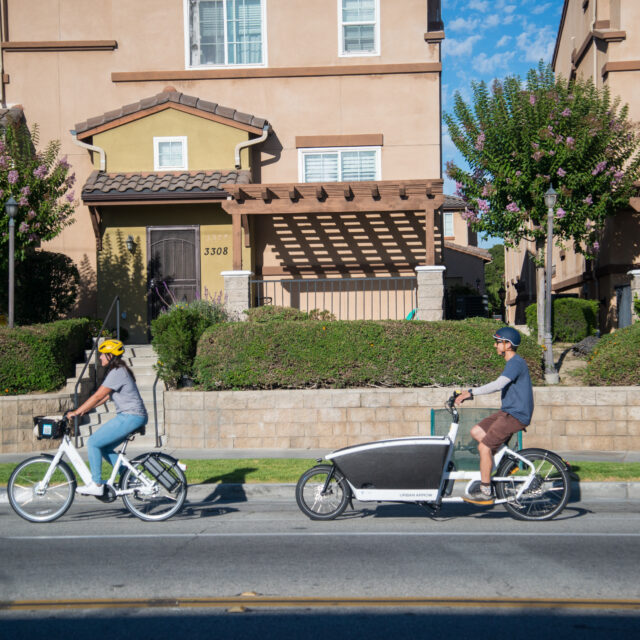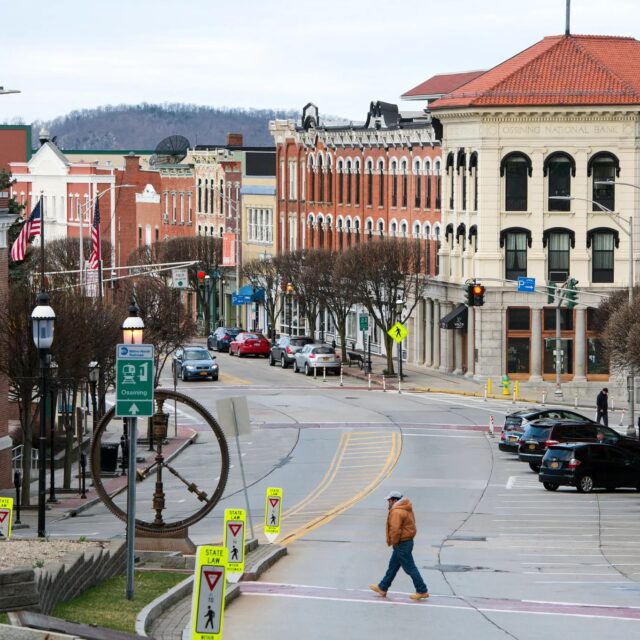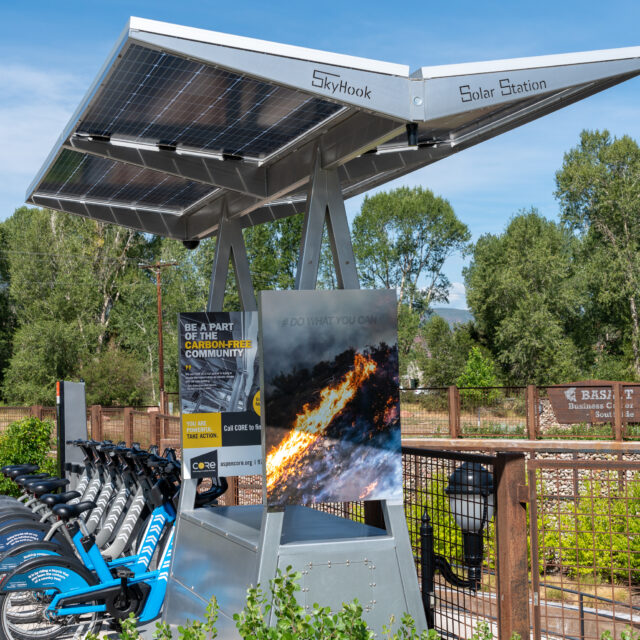A Bike Share System Built for the Mountains
by Kiran Herbert, Communications Manager
April 19, 2023
In Eagle County, Colorado, Shift Bike was designed to be an inter-town transportation solution that works for everyone.
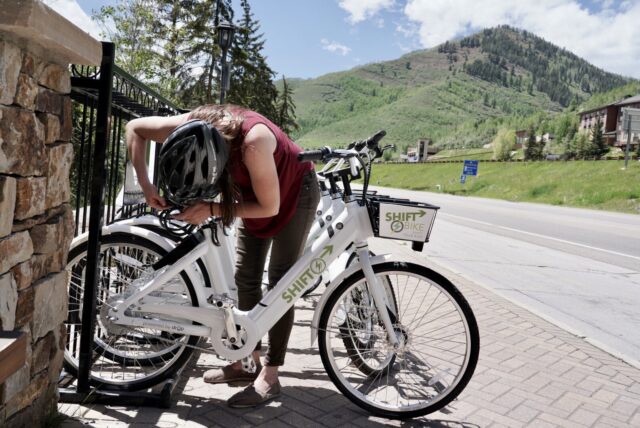
Think bike share, and your mind typically imagines an urban center, riders navigating a network of city streets with buildings as a backdrop. You probably wouldn’t think of Vail, Colorado, an affluent resort town famous for its skiing and mountain views. Nevertheless, Vail is the birthplace of Shift Bike, an all-electric, seasonal bike share system that first launched in 2022.
While bike share is relatively new in Vail, bicycling for both recreation and transport is firmly engrained in the local culture. In the summers, mountain biking is incredibly popular and for about a decade, the town has sponsored Sole Power, a fun, green commuting challenge for the Eagle Valley. That program is overseen by Beth Markham, the Town of Vail’s environmental sustainability manager, who, noting its success, decided to pilot an electric bike share system in 2020. Thanks to $25,000 in funding, that 12-bike system debuted in 2020.
“We really just wanted to see if people would use it and we saw that they did,” says Markham, noting that the system didn’t have the critical mass of bikes and stations for it to be truly effective. Markham also received a lot of feedback from bike shop owners, who felt like they were competing for customers with the new bikes. “We took the next year off as a planning year and went looking for regional partners.”
The nearby Town of Avon and the Eagle-Vail Metropolitan District, an unincorporated community, agreed to join forces. Last June, Vail, Eagle-Vail, and Avon launched Shift Bike as a regional bike share system, with 90 bikes and 20 station hubs from Drop Mobility. Incorporating the feedback from the local bike shops, the new system was intentional about targeting residents and ensuring that visitors understood the difference between bike share (a great option for getting from point A to B) and bike rentals (the right choice for longer, recreational rides).
“We priced the system in a way that focuses on local memberships and encourages visitors to only use bike share for short commutes,” says Markham, adding that the pay-as-you-go plan costs $3 to unlock for 30 minutes of ride time and costs 40 cents per minute after that. “It’s super cost prohibitive for someone to use it all day.”
To ensure the program is affordable for anyone who lives, works, or owns property in Eagle County, there’s a Local’s Only membership, which costs $100 for the season or $25/month (due to the region’s climate, Shift Bike operates from roughly mid-May through October). Those memberships include 60 minutes of ride time daily and cost 15 cents per minute after that. Any local that receives some form of local, federal, or state assistance can apply for the system’s Equity Membership, which costs $25 for the season and includes 60 minutes of ride time and 5 cents a minute thereafter.
“It really makes it affordable and user-friendly for everyone,” says Markham. “Whether you’re using it to commute for work, social engagements, happy hours, or grocery shopping — whatever your needs are — hopefully this is providing an alternative transportation solution.”
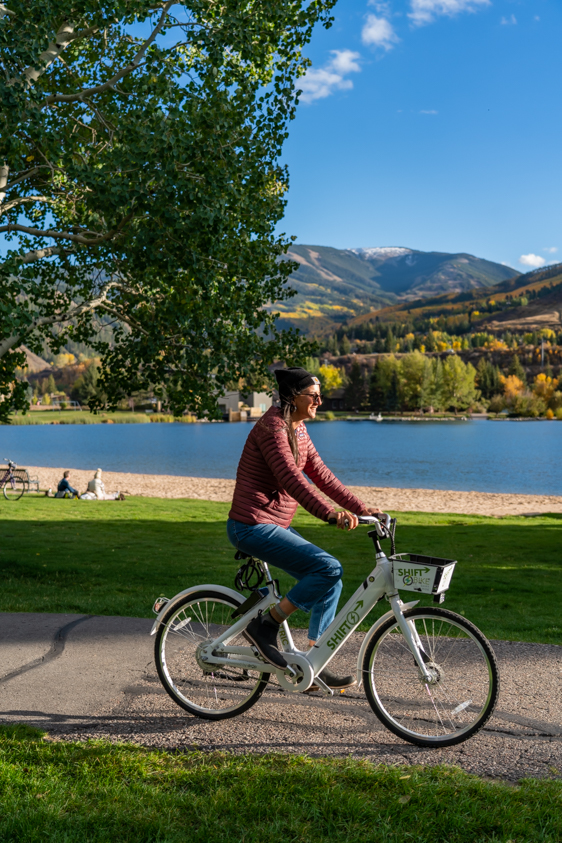 While Vail itself has a free bus system, the larger county system does have a fee and isn’t always the most convenient. For those that don’t have a car or are simply keen on a different way to get around, bike share can either replace a bus trip or serve as a multimodal solution. In 2022, residents in Eagle County voted to create a regional transportation authority — the Eagle Valley Regional Transit Authority — and the hope is that the Shift Bike system will eventually join transit in living under that umbrella, helping the modes work together to better serve residents.
While Vail itself has a free bus system, the larger county system does have a fee and isn’t always the most convenient. For those that don’t have a car or are simply keen on a different way to get around, bike share can either replace a bus trip or serve as a multimodal solution. In 2022, residents in Eagle County voted to create a regional transportation authority — the Eagle Valley Regional Transit Authority — and the hope is that the Shift Bike system will eventually join transit in living under that umbrella, helping the modes work together to better serve residents.
This year, Shift Bike will expand to include 155 bikes and 33 stations stretching from Edwards in the west to Vail in the East. The stretch, which parallels I-70, the major highway that connects the mountain towns, boasts a paved, multimodal path ensuring riders feel safe using bike share to commute between towns (the region is close to having a completed bike path from Vail to Glenwood Springs, some 65 miles away). That the bikes are all electric and boast solid foam tires means that people can easily ride greater distances and travel without fear of getting a flat.
As part of the expansion, the Town of Vail recently received a $50,000 grant from the Colorado Department of Transportation. The grant, which is part of a statewide effort to help Colorado communities reduce congestion and emissions, will help with the system’s footprint expansion as well as efforts to further target underserved communities. The majority of the new stations added will target local workforce housing areas, which tend to be high-density, income-qualified areas with multi-family units. The goal is to better serve the population that staffs schools, resorts, restaurants, and hotels, essentially helping everything run.
“This year we’re planning on doing a lot more community engagement,” says Markham, adding that Shift Bike will be partnering with Vail Health, the local hospital, to provide free helmets to community members, and will be doing launch events in different income-qualified communities. “We hope to have Spanish translators — we really want the system to be accessible for all.”
In determining what made the most sense for Vail, Markham spoke with the few other mountain systems out there, including WeCycle in Colorado’s Roaring Fork Valley (another regional model), Summit Bike Share in Park City, Utah, and BCycle Boulder in Boulder, Colorado. By trying out other systems, Markham was able to see what worked best for her community. She cautions that doing community outreach ahead of time is equally important.
“Talk to the community, talk to bike shops — build relationships so that your program is supporting what they’re doing,” says Markham. “There are solutions out there that can work in all environments.”
The Better Bike Share Partnership is funded by The JPB Foundation as a collaboration between the City of Philadelphia, the National Association of City Transportation Officials (NACTO), and the PeopleForBikes Foundation to build equitable and replicable bike share systems. Follow us on LinkedIn, Facebook, Twitter, and Instagram or sign up for our weekly newsletter. Got a question or a story idea? Email kiran@peopleforbikes.org.

